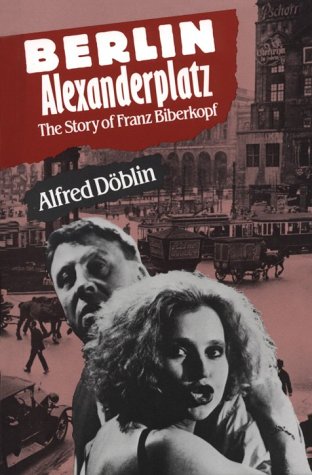
BERLIN ALEXANDERPLATZ BY ALFRED DOBLIN
Required reading in Germany I'd never heard of until I saw
it on a list of recommendations by Roberto Bolano, maybe in The
Last Interview. Bought a copy with too small print, too tight margins,
didn't read it. Got this more friendly formatted copy and recently saw
it recommended by Sesshu Foster, whose Atomik
Aztex I loved. Finally started in on its 635 pages a few weeks ago
and now am finally done. It's well worth it. At first I wasn't sure what
I was in for. It's not really anything like Joyce, per the book's blurbs,
not musical, not based on classical lit, not really seeming to take on
Goethe instead of Shakespeare. More like Dostoevsky, maybe, but with lots
of modernist techniques -- shifting POVs (often from sentence to sentence),
shifting tenses; inclusion of statistics, weather reports, police blotters;
no hard returns in long stretches of dialogue so all the quotations/voices
run together in really dense oft-confusing paragraphs; no-transition interspersal
of biblical stories (Abraham's sacrifice of Isaac; Job's trials) into otherwise
realist scenes; excellent dialogues between angels responsible for Franz;
appearance of the seven-headed Whore of Babylon and Death; a great section
very much like in Atomik Aztex (which also lacked hard returns in
stretches of dialogue) relating a lamb's last moments in a slaughterhouse
-- all of which nicely complicates what's otherwise a straight-up realist
tale about a sad sack trying to do right and live a decent life. The book
starts with Franz's release from prison after seven years for manslaughtering
his girl. Berlin is a major character in this, of course -- one of those
Bellowy/Franzeny books about permeablility between citizen and civilization.
Franz is a representative man for the mid-to-late '20s Germany, wherein
things ain't so good and the seeds of things way worse are sown and sprouting
little swastikas. Nearly five stars for me, but the translation seemed
a little off -- or more so, Doblin included mucho 1920s-era German slang,
subsequently translated into 1920s-era British slang, so there's this Al
Caponesque hard-boiled cockneyed thing going on in the dialogue that wasn't
always so accessible for this American ninety years later. Would love a
fresh translation by Michael Hofmann. The portrayal of women, also, is
real ripe for a feminist critique bashing o'er the head -- the two major
women are supportive whores, and one is sort of hysterical, not that this
really concerned me all that much, but the extra overt masculinity of everything,
the reduction of women to the oldest fashioned roles, did seem a bit over
the top. Anyway, a great book about a burly well-meaning low life trying
to live a decent life, bashed not by feminist theorists but life itself,
by what he considers his fate which is really the consequences of his choices,
his lazy perceptions. Keep your eyes open, Franz. Don't wear no armbands,
don't be a joiner. "Keep awake, keep awake, for there is something happening
in the world. The world is not made of sugar . . . Fate, Fate! It's no
use revering it merely as Fate, we must look at it, grasp it, down it,
and not hesitate. Keep awake, eyes front, attention, a thousand belong
together, and he who won't watch out, is fit to flay and flout." Now I
guess I gotta watch the
14-hour Fassbinder film . . .
*
Forever after at http://eyeshot.net/berlin_alexanderplatz.html
|